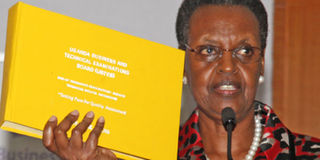Government in crisis meeting after curriculum halted

The Minister of Education and Sports, Ms Janet Museveni, during the release of UBTEB results of 2016.
FILE PHOTO
Government yesterday held a crisis meeting to respond to Parliament’s resolution which suspended implementation of the revised lower secondary school curriculum on account that the implementers were ill-prepared for the task.
The new curriculum had been scheduled to start this school term.
The Ministry of Education’s top management, officials from the National Curriculum Development Centre (NCDC) and Directorate of Education Standards convened yesterday to discuss a way forward after the suspension on Tuesday.
A highly placed source told Daily Monitor that at the meeting, officials from NCDC presented minutes of their previous meetings with some MPs during the consultative period.
The source said the NCDC officials expressed disappointment to see that some of legislators who had been consulted for input on the new curriculum were among those who opposed the implementation.
However, the source said Education officials met the Minister of Education, Ms Janet Museveni on Wednesday, and she promised to brief Cabinet on the way forward on Monday.
Yesterday, the top management met and discussed the issues the MPs raised before the Cabinet meeting.
Mr Alex Kakooza, the ministry’s permanent secretary, confirmed the morning meeting, and said Parliament would advise Cabinet.
He also said they would meet the ministry’s political leadership for a common position before they pronounce themselves on their next step of action.
“We are looking at the available options. We shall give our position. We have had a meeting this morning (yesterday) as the technical team. We are going to meet our political leaders tomorrow (today) and will issue a statement on the matter after,” Mr Kakooza said.
The source said the ministry of Education and NCDC officials later realised there was a lot of vital information that MPs did not have about the new curriculum which led them to reach a wrong conclusion.
The source said, for example, the ministry has been training at least four teachers from each school and each of them teaches two subjects. This means that there are eight subjects being handled in each of the schools that have had their teachers trained on new curriculum, but the MPs did not know this.
“We realised that there was a lot of information the MPs didn’t have. The information, which has been in bits has been put together and we hope this will be better,” the source said.
MPs halted the implementation until government addresses the gaps in human resource recruitment, training and availability of the relevant textbooks. This was the second time the curriculum was receiving resistance from stakeholders.
In 2016 when the curriculum developers were ready to pilot it in 20 secondary schools before rolling it out nationally, President Museveni met university vice chancellors and they agreed to halt it on account that many stakeholders had not been informed about the changes.
They later asked NCDC to revisit their proposals and retain the subject-based curriculum from the eight strands they had introduced under themes. The curriculum has since been reduced from 43 teaching subjects under the current curriculum to 21.
There were also efforts to remove obsolete teaching content, merger of content to remove repetitions or duplications and upgrade the content such as adding technology into the curriculum.
Under the new curriculum, the student assessment model is also expected to change. Formative assessment will account for 20 per cent of the student’s achievements in the course of their four-year study while summative assessment, which will be awarded by Uganda National Examinations Board, will contribute 80 per cent to the candidate’s final score at Senior Four.
Demands
The MPs want Ministry of Education to first avail the new textbooks to schools and train more teachers in addition to recruitment of teachers to reduce on the student-teacher ratio burden that is currently 1:50 with some schools going up to 1:100. The standard ratio is 1:40.
The MPs were also concerned that the new curriculum had not been piloted in order to observe and identify whether there were any gaps and find solutions before rolling it out.
Senior One students report on February 17 although some private schools have already started Senior One classes.
“This is called organised chaos. The supervisors of our institutions are head-teachers. But they are green [ignorant] about this curriculum. I don’t think we are ready. Somebody picked things here and there and put them together and said here we are go and train. We ask the minister to retract the policy for the good of this country and our children,” Mr Mathias Mpuuga (Masaka Municipality).
Budadiri West MP Nathan Nandala Mafabi (pictured left) moved the motion to halt the curriculum implementation and the House endorsed it.




